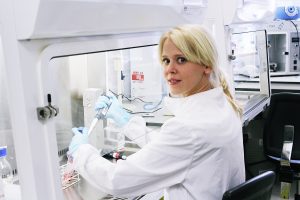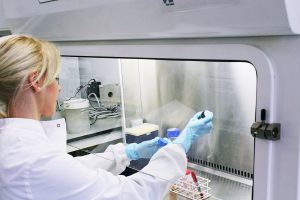Cara Tomas is working right on the interface between laboratory sciences and the National Health Service.
 “My area of research looks at Chronic Fatigue Syndrome (CFS) with my PhD thesis focusing on investigating the role of cellular bioenergetic abnormalities in CFS. However, my research has spread beyond this core interest in bioenergetics in CFS to include looking at various other aspects of the disease including mitochondrial DNA abnormalities, the interaction between sleep and cortisol in CFS patients, and the role of cardiac abnormalities in CFS.”
“My area of research looks at Chronic Fatigue Syndrome (CFS) with my PhD thesis focusing on investigating the role of cellular bioenergetic abnormalities in CFS. However, my research has spread beyond this core interest in bioenergetics in CFS to include looking at various other aspects of the disease including mitochondrial DNA abnormalities, the interaction between sleep and cortisol in CFS patients, and the role of cardiac abnormalities in CFS.”
Cara has a long-standing personal interest in her area of work, that started at an early age:
“My interest in CFS first began at age 13 when I was diagnosed with the disease myself and was rendered bedridden for two years. My research in CFS began during the summer after the first year of my undergraduate degree in biomedical sciences when I contacted Prof Julia Newton, a prominent and very well respected clinician within the field of CFS research. I have now worked alongside Julia for more than 5 years looking at various aspects of the disease.”
As with many of our students, Cara’s PhD research has made a genuine contribution to our understanding of a chronic and debilitating disease.
 “I have now had a number of papers published, and my research has also been covered in the New Scientist (1). One of my most recent publications outlined results from a study conducted to investigate whether the mitochondrial function of cells from CFS patients differed from those of healthy controls (2). Our results showed significantly lower mitochondrial function in cells from CFS patients. The results showed CFS cells are less able to produce energy to meet the energetic requirements of cells and fulfil cellular energy demands. This research has enabled us to identify a particular cell type (PBMCs) that show abnormal mitochondrial functioning in CFS patients and has allowed us to identify mitochondrial dysfunction as a potential disease pathway.”
“I have now had a number of papers published, and my research has also been covered in the New Scientist (1). One of my most recent publications outlined results from a study conducted to investigate whether the mitochondrial function of cells from CFS patients differed from those of healthy controls (2). Our results showed significantly lower mitochondrial function in cells from CFS patients. The results showed CFS cells are less able to produce energy to meet the energetic requirements of cells and fulfil cellular energy demands. This research has enabled us to identify a particular cell type (PBMCs) that show abnormal mitochondrial functioning in CFS patients and has allowed us to identify mitochondrial dysfunction as a potential disease pathway.”
We are delighted that Cara has secured a postdoctoral position in the laboratory of Professor Mark Walker, and we are sure this is not the last we will hear of her research career.
-
http://www.meassociation.org.uk/2017/11/new-scientist-blood-cells-in-chronic-fatigue-syndrome-are-drained-of-energy-04-november-2017/
-
Tomas C, Brown A, Strassheim V, Elson J, Newton J, Manning P (2017) Cellular bioenergetics is impaired in patients with chronic fatigue syndrome. PLoS ONE 12(10): e0186802. https://doi.org/10.1371/journal.pone.0186802
